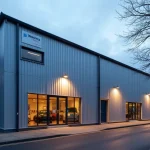As many of you know, Agile methodologies have been the talk of every town in the tech industry worldwide, and Liverpool is no exception. The Agile approach offers a flexible and efficient way of managing software development projects. As such, it has become a favoured strategy among many Liverpool software development companies. In this article, we’ll delve into the best practices for implementing Agile methodologies in a Liverpool software development company.
Embrace a Cultural Shift
Adopting Agile methodologies is not just about implementing a new set of operational rules; it’s about creating a cultural shift within your organisation. The Agile approach is centred around teamwork, communication, customer collaboration, and responsiveness to change.
Lire également : How Can a Leeds Toy Store Implement a Subscription Box Service Effectively?
To effectively implement Agile, companies need to foster a collaborative and transparent work environment where every team member feels comfortable sharing ideas and expressing concerns. This includes breaking down silos, encouraging cross-functional team collaboration, and promoting open dialogue with stakeholders and customers.
Additionally, embracing the Agile approach means adopting a customer-centric mindset. This involves prioritizing customer satisfaction by delivering iterative and incremental software solutions that meet their evolving needs and expectations.
A lire également : What Are the Best Practices for Conducting User Experience Research in a Bristol Software Company?
Employ Agile-Friendly Project Management Tools
A successful implementation of Agile methodologies relies heavily on the use of appropriate project management tools. These platforms facilitate collaboration and communication among team members, provide visibility into project progress and performance, and enable effective management of resources and tasks.
JIRA, Trello, and Asana are among the most commonly used Agile project management tools. They offer features like Kanban boards, Scrum boards, and sprint planning tools, which are essential for managing Agile projects.
When selecting a tool, consider factors such as the size and complexity of your projects, the specific Agile framework you’re using (Scrum, Kanban, etc.), and the technical proficiency of your team. It’s crucial to provide adequate training to your team to ensure they can effectively use the chosen tool.
Build High-Performing Agile Teams
In Agile, the team is at the heart of the project. Building high-performing Agile teams requires continuous improvement, self-organization, and shared accountability.
High-performing Agile teams are cross-functional, meaning they have all the necessary skills within the team to deliver the project. They work together collaboratively, breaking down complex tasks into manageable chunks and continuously prioritizing the work based on the highest value to the customer.
Teams should also be self-organizing, meaning they have the ability to decide how best to accomplish their work, rather than being directed by others outside the team. This enhances team ownership and engagement.
Accountability is also a key attribute of high-performing Agile teams. This means each team member is responsible for the team’s successes and failures, fostering a sense of collective ownership and driving high-quality outputs.
Prioritize Continuous Improvement
Continuous improvement is one of the key principles of Agile. It involves regularly taking time to reflect on how to become more effective and then tuning and adjusting the team’s behaviour accordingly.
This can be achieved through practices like retrospectives, where teams reflect on their performance and identify areas for improvement. It’s important to create a safe and open environment where everyone feels comfortable providing and receiving constructive feedback.
Continuous improvement also involves staying on top of industry trends and best practices. This could mean regularly attending Agile conferences or Meetups, subscribing to Agile newsletters, or participating in online Agile communities.
Foster a Close Collaboration with Clients
As Agile methodologies advocate for customer collaboration, it’s crucial for Liverpool software development companies to foster close relationships with their clients. This means maintaining regular communication, inviting them to participate in planning and review meetings, and keeping them involved in decision-making processes.
This approach ensures that the software solution being developed aligns with the customer’s needs and expectations. It also enables the team to receive early and continuous feedback from the customer, which they can use to make necessary adjustments to the project.
Remember, implementing Agile methodologies requires a significant shift in mindset and work practices. It’s not a simple overnight transition, but rather a journey of continuous learning and improvement. But with these best practices, you’re well-equipped to embark on this journey and reap the many benefits Agile offers.
Remember, in the words of the Agile Manifesto, “we are uncovering better ways of developing software by doing it and helping others do it.” So get out there, start implementing Agile in your Liverpool software development company, and start experiencing the benefits of this approach for yourself.
Demystifying the Agile Frameworks
To implement Agile methodologies in a Liverpool software development company, understanding the various Agile frameworks is crucial. Each framework has its unique characteristics and is best suited to specific types of projects.
Starting with Scrum, it’s a popular Agile framework that organises work into small, manageable pieces known as sprints. Scrum teams work in time-boxed iterations, focusing on delivering valuable increments of work. This framework boosts productivity by promoting transparency, inspection and adaptation.
Kanban, on the other hand, is a visual system for managing work as it moves through a process. It visualises both the process and the actual work passing through that process. This aids in understanding bottlenecks and inefficiencies in a project, thereby enabling teams to deliver more consistently.
Then there’s Lean Software Development, inspired by lean manufacturing principles. It emphasizes eliminating waste, amplifying learning, deciding as late as possible, and delivering as fast as possible. It’s a powerful framework for complex and uncertain situations.
Lastly, Extreme Programming (XP) stresses customer satisfaction and promotes high-quality software development and delivery, focusing on small, frequent releases, continuous feedback, and shared understanding.
As a Liverpool software development company, you’ll need to examine your project’s needs, your team’s capabilities, and choose the framework that aligns best. Understanding each Agile framework is a crucial step in adopting Agile methodologies.
Emphasizing Quality Assurance in Agile
In Agile development, quality assurance goes beyond just testing. It becomes an integral part of every phase of the development process.
In Agile, testers and developers work closely together. Testers are involved from the start of a project, not just in the final stages. This brings testing into the fold, making it part of the ongoing conversation, rather than an afterthought.
Agile methodologies stress the importance of delivering potentially shippable increments of software at the end of each sprint. To fulfill this, testing can’t be left till the end. Instead, Agile teams use continuous testing, where tests are executed at every stage of the development process, catching and fixing issues early.
Automated testing is another approach that dovetails perfectly with Agile. It helps teams to quickly test and retest, allowing for faster feedback and quicker iterations.
Quality assurance in Agile underscores the need for consistent, relentless focus on quality, every step of the way. By integrating quality assurance into the fabric of your Agile teams, you can help ensure the delivery of great software, on time and within budget.
Conclusion
Adopting Agile methodologies can be a transformative experience for a Liverpool software development company. From embracing a cultural shift to building high-performing teams, leveraging Agile-friendly tools, prioritising continuous improvement, fostering client collaboration, understanding the Agile frameworks and integrating quality assurance, it’s a comprehensive approach that touches all aspects of your software development process.
Remember, as with any significant change, patience is vital. Agile is not an overnight solution, but a journey of learning, adapting and improving. As you navigate this journey, keep the end goal in sight – delivering high-quality software solutions that fulfill your customer’s needs and expectations.
By adhering to these best practices and remaining committed to the Agile principles, you stand to gain significant benefits – increased productivity, improved customer satisfaction, and a more engaged, collaborative workforce. So, embrace the Agile journey, and let it guide your Liverpool software development company to new heights of success.






